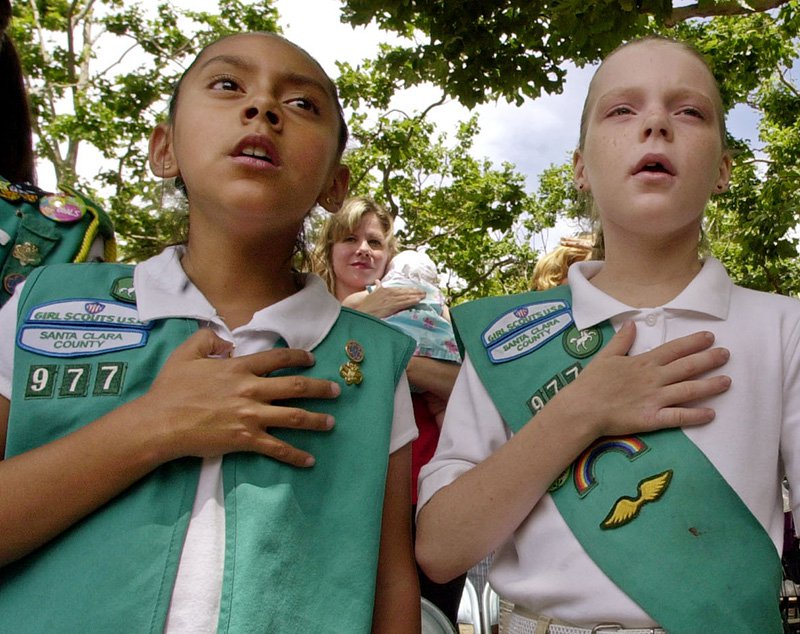In the latest of high-profile moves to open up its membership, the Boy Scouts of America announced this week that it would allow girls and young women to participate in more of its programming. Many see this as a big step forward for girls; another wall keeping young women from certain opportunities has fallen. And for some young women, the chance to participate in Boy Scouting programs will give them a chance to pursue their goals in exciting ways. But the new policy isn’t a straightforward win for girls.
Initial reports on the Boy Scouts’ policy indicate that small groups for young members (known in the Boy Scouts as Cub Scout dens) will continue to be single gender, so girls will still have access to leadership opportunities in a single-gender environment. But there’s a difference between being in a girl-led group within a larger entity whose entire history and mission has been about serving boys and being part of an organization like the Girl Scouts whose central focus has always been on building “girls of courage, confidence, and character, who make the world a better place.” Even with careful research and preparation, Boy Scouts’ efforts to serve girls in single-gender groups will still be built on a long legacy of focusing on boys’ needs. Everything meant to serve girls specifically will be an adjustment, not the default, central focus. Will a Boy Scouts’ program meant to introduce girls to public service, for example, take the same careful steps to make sure young women meet female elected officials, like one in which I participated as a Girl Scout in high school?
It’s not just that opening up the Boy Scouts to girls has the potential to move girls out of a girl-led, girl-centered organization. Even for girls who aren’t currently participating in Girl Scouts, the move sends a troubling message: You can do more as a girl in a boys’ organization than you can as a girl in a girls’ organization. We already use what boys achieve in Boy Scouts as our point of reference for what girls accomplish in Girl Scouts because the former is more familiar to the broader public than the latter. Nowhere is this clearer than in the case of the Girl Scouts’ highest honor, the Gold Award. Proponents of the Boy Scouts’ policy change have emphasized girls’ newfound ability to earn Eagle Scout rank as one of the most exciting things about opening up aspects of Boy Scouting to girls. Colleges and prospective employers, they argue, understand the work it takes to become an Eagle Scout and see young men who have earned the Eagle Scout rank as attractive candidates.
They’re not wrong. Achieving Eagle Scout status is a significant accomplishment, and the young men who earn it deserve the respect they get. And yes, the Eagle Scout rank is far more familiar to many Americans than the Gold Award. Indeed, I’ve spent the last 15 years explaining my Girl Scout Gold Award to friends, colleagues and prospective employers as the “Girl Scout version” of the Eagle Scout rank. But the solution to that imbalance shouldn’t be telling girls to abandon their Girl Scout troops to go after the boys’ honor. It should be giving the girls’ achievement — which requires working hard to build the same skills we celebrate so publicly in Eagle Scouts — the respect it deserves.
By telling young women that they need to earn Eagle Scout rank to get the recognition and benefits it conveys, we are sending a crystal-clear message: To get the respect you deserve for your achievements, you have to join a historically male-oriented organization and meet that group’s definition of success. Putting in the hard work to make a difference in your community as part of a girl-centered organization just isn’t enough.
I recognize that there are girls and families for whom the Girl Scouting programs in their communities don’t meet their needs. For older girls, existing coed Boy Scout programs can and do help address those shortfalls. I know, because I also participated in one of those programs, Venturing, as a high school student in part to pursue activities beyond what my Girl Scout troop was offering. I applaud the activism of the young women who have been pushing for the policy change. Even if they find that Girl Scouts don’t meet their needs, identifying what you see as a problem in the world and working to change it is exactly what Girl Scouting teaches, and I hope they find fulfilling experiences in the new Boy Scouting programs. But the Boy Scouts’ policy change isn’t just about the opportunities it creates for individual girls. It’s about what we convey to young women about their achievements and the context in which they pursue them — that they are less valuable, simply because they weren’t designed by men.
Molly E. Reynolds is a fellow in the Governance Studies program at the Brookings Institution. She is a lifetime member of the Girl Scouts of the USA and a recipient of the Girl Scout Gold Award.
Send questions/comments to the editors.



Success. Please wait for the page to reload. If the page does not reload within 5 seconds, please refresh the page.
Enter your email and password to access comments.
Hi, to comment on stories you must . This profile is in addition to your subscription and website login.
Already have a commenting profile? .
Invalid username/password.
Please check your email to confirm and complete your registration.
Only subscribers are eligible to post comments. Please subscribe or login first for digital access. Here’s why.
Use the form below to reset your password. When you've submitted your account email, we will send an email with a reset code.